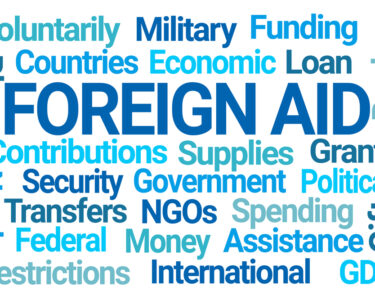The Center for Effective Philanthropy’s State of Nonprofits report is timely and insightful, and many of its findings are an important reality check. We are in a time of great challenges on many fronts. It is fitting to refer to this period as a crisis in the nonprofit sector.
The manmade crisis is marked by funding cuts from government sources, threats to long-standing programs and commitments, a deep chilling effect on our freedoms, and profound uncertainty about the state of the economy and the funding landscape. These factors are well-described in the CEP report.
It was hard enough to lead a nonprofit before. It didn’t need to get harder. And yet, as this report documents, it has.
As a funder, I can say that we hear you, and we see this dynamic. That’s a big part of why MacArthur has promised to increase our giving by 20 percent or more in the coming two years (we are shifting the floor, not the ceiling), and providing every ounce of flexibility in our funding as we can.
In that spirit, I want to respond directly and in more detail to a few of the quotes in the report that caught my attention.
Flexible Funding
One suggestion to funders was: “Flexible funding allows organizations to sustain critical programs, respond to policy changes, and invest in infrastructure without constant financial uncertainty.”
At the MacArthur Foundation, we hear this, and we agree. Nonprofits should have flexibility in how they allocate their budgets, and funders should support grantee health. In large measure, MacArthur uses flexible funding in most of our programs.
There are two considerations I would like to add that may be helpful insights for our nonprofit colleagues.
The first consideration is that when we fund long-term general operating support, we unfortunately cannot welcome as many new grantees, as we would if we made smaller, shorter, project-based grants. That can be frustrating to new grantseekers and can slow change in philanthropic practice. The hard truth for MacArthur is that we hear from many more organizations than we have capacity to fund with flexible funding. This is not a symptom of a “scarcity mindset,” as I have been told, but it is basic arithmetic that requires a trade-off.
The second consideration relates to trust-based philanthropy, which is part of the backbone of flexible funding. We practice it at MacArthur with full-throated enthusiasm — we are, for example, best known for the MacArthur Fellows Program, a five-year, no-strings-attached award celebrating creative individuals. But trust-based philanthropy is not only funders trusting grantees: trust is a relationship. Trust is built over time, and it can also be broken. Ideally, trust ensures that both grantees and foundations can meet our missions and accomplish our goals, consistent with mutual accountability and shared values. Acknowledging it as a two-way street, though rarely addressed, is a necessary condition for trust-based philanthropy to be sustainable and to help “call in” other funders.
Uncertain Landscape
As to the outlook for future funding, the report notes: “Our private funders and individual donors are spread thin, with many causes needing their attention,” and: “we simply do not know whether private foundation grants will keep up.”
This sounds accurate to my ear as a foundation president. There’s no way to say whether a specific organization will “keep up” grants issued this year. Many nonprofits have long grappled with developing new revenue models — as we see in nonprofit news. And the current context is particularly anxiety inducing.
We know this anxiety well. Many of us who work in foundations have also worked in or led nonprofits. It’s a positive thing about our sector — we often have the perspective of both the business of raising money and of distributing funds. Before becoming a foundation staff member, I had to meet payroll largely through philanthropic donations for 18 years in my roles as head of school at Andover and as the executive director of the Berkman Klein Center for Internet & Society.
My hope and prediction is that overall, institutional philanthropies and large family donors will give more, not less, in the coming two to four years. I believe this for two reasons.
First, there is simply more privately held wealth than there was even five years ago that could be given away. Though non-defense discretionary public funding is dwindling, many foundation endowments and philanthropic families have added to their wealth as the stock market has soared over the last five years.
Second, we are part of a growing trend of foundations committing to increase their payouts during this time of crisis — witness the commendable payout commitments from the Marguerite Casey Foundation, Freedom Together, and the Woods Fund. More dramatically, we may well see additional infusions of cash from spend-downs of foundations ranging from the Gates Foundation, the nation’s largest, to the Stupski Foundation and the James B. McClatchy Foundation.
Realistically, the outlook will vary by area of giving. Any increase in potential funding across the board will come as cold comfort for nonprofits whose areas of work will see declines in funding, while some organizations will be able to find a new gear as funding increases.
Courage is Contagious
Finally, I was struck by this quote about use of voice: “How loudly should we raise our collective voices if doing so puts people at risk, and how might we channel the activism of the past and care for our communities responsibly and for the long haul?”
My reaction is simple: while there are risks and trade-offs to any individual, institution, and community and everyone is differently positioned, I hope that the answer broadly is to speak up for our values and for our work.
Courage is contagious! When we speak up to defend our values, values that I would argue define our country, it helps give others the confidence to stand up for their beliefs. We have seen so many examples of courageous action.
A newly-launched initiative called The Courage Project, publicly recognizes the contributions individuals and organizations who take a principled stand in the face of adversity, building bridges across communities and making our country stronger.
And, as you may know, I have joined with many of my peers to Unite in Advance and defend the nonprofit sector. With my colleagues Tonya Allen, president of the McKnight Foundation, and Deepak Bhargava, president of the Freedom Together Foundation, we wrote: “When attacks come, foundations must speak up — not just for ourselves, but for every grantee and every family impacted by nonprofits whose survival may depend on our courage.”
Defending Our Freedoms
I leave you with this: The freedoms to give, and invest, and express ourselves are bedrock principles of the American tradition. And any charitable institution — a church, a foundation, a library, a hospital — depends on the freedom to give, so they can fulfill their mission, values, and beliefs. But those freedoms are in question.
When we defend the freedom to give, we are defending the right every of American to support the institutions and issues they care about, regardless of who is in power.
If not us, who? If not now, when? We in foundations are standing with you, with shared values, and with the communities that we all serve. If you are not hearing us, please let your funders know. Together we can be more effective in our work and in using our voices, and we can emerge from this period of crisis stronger than before.
John Palfrey is the President of the John D. and Catherine T. MacArthur Foundation.
👇Follow more 👇
👉 bdphone.com
👉 ultractivation.com
👉 trainingreferral.com
👉 shaplafood.com
👉 bangladeshi.help
👉 www.forexdhaka.com
👉 uncommunication.com
👉 ultra-sim.com
👉 forexdhaka.com
👉 ultrafxfund.com
👉 bdphoneonline.com
👉 dailyadvice.us




